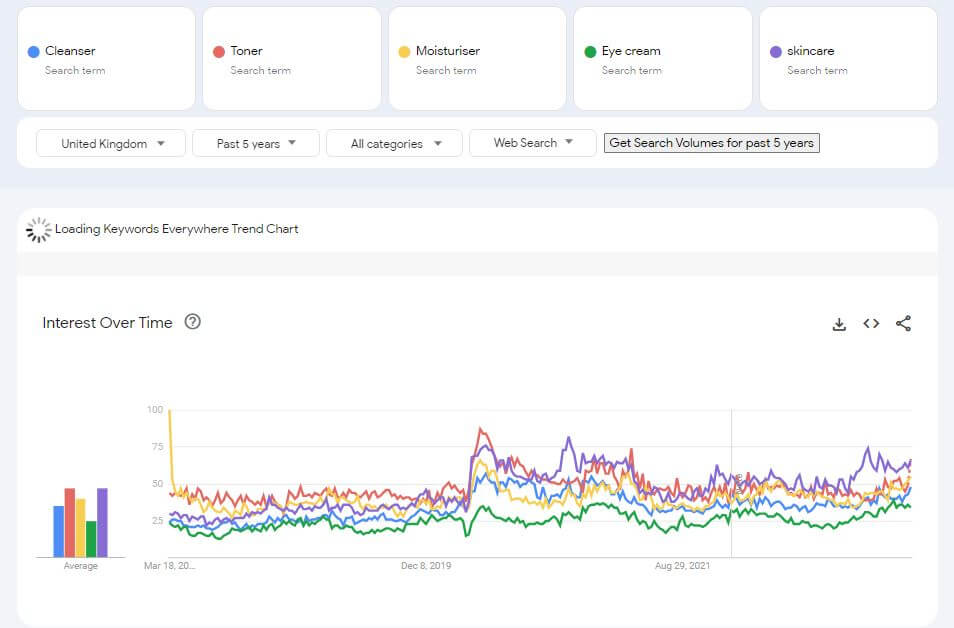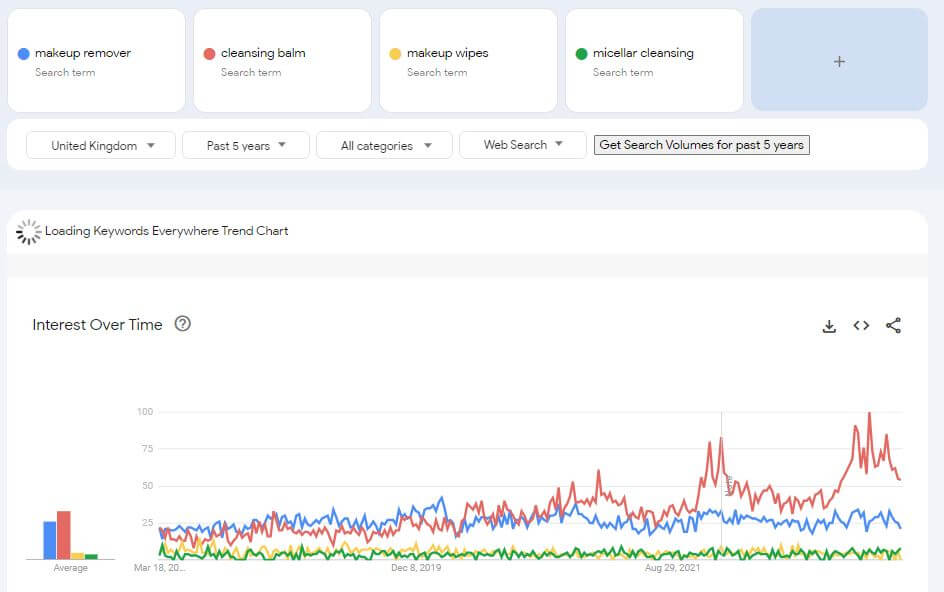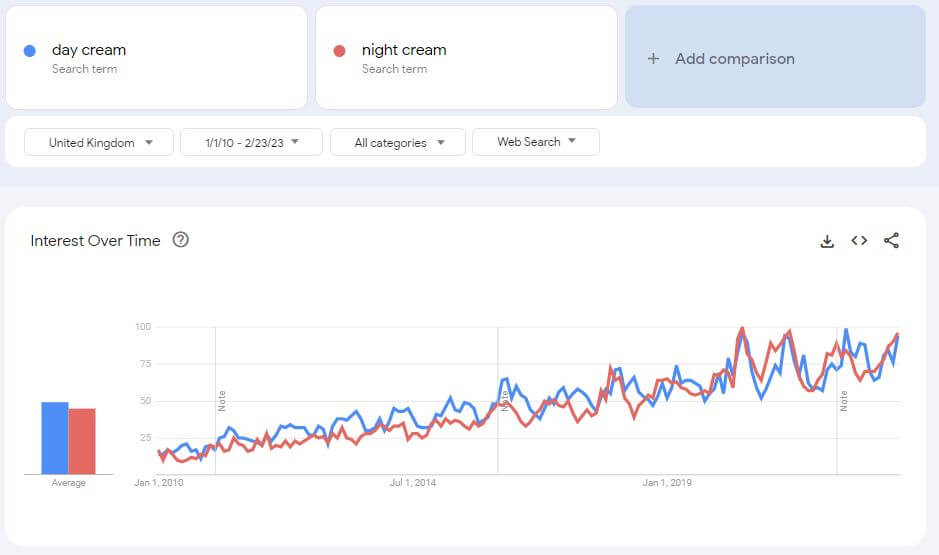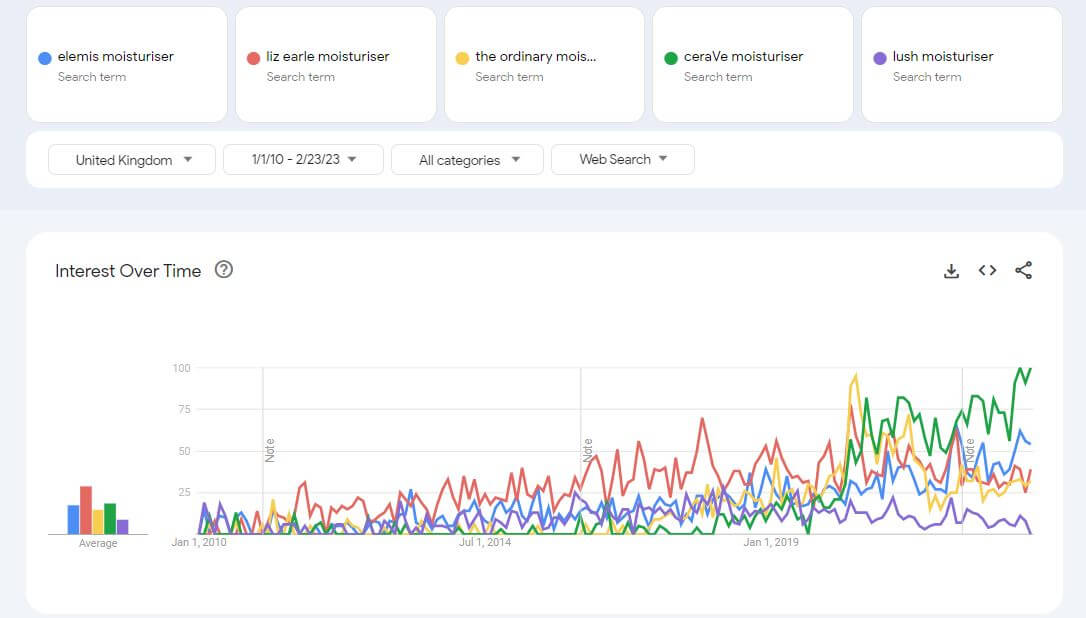Organic Search Trends: Nighttime skincare products
As of 2021, the UK’s skincare market is worth £3.1 billion and is growing year on year and only seems to be getting bigger as the industry grows. The market is vast and varied, catering to every skin type, condition, budget, and age.
Everyone’s skincare routine is different, choosing products that work best for them. As a rule, a skincare routine follows a specific pattern with only minor changes between a morning and night routine.
With World Sleep Day falling on Friday 17th March this year, now is the perfect time to take a closer look at skincare and consider how sleep affects the skin. Let’s dig deep into the pores of the skincare industry and find out what online users are looking for to enhance their evening skincare routine.
How sleep affects the skin
A person can reflect signs of a poor night’s sleep in many ways, but the most obvious is how your skin looks. Sleep deprivation can show itself through darker undereye circles, paler skin, wrinkles, and swollen eyes.
During sleep, your skin repairs itself in a variety ways.
- Skin cells regenerate – After spending the day fighting off UV rays, pollution, sweat, and grime, skin is desperate for a break.
- Collagen rebuilds – When humans sleep, the body produces more collagen, which is key for keeping skin plump and smooth, and also benefiting hair and nails.
- Stress levels reduce – Lack of sleep increases cortisol levels (the stress hormone) and puts the skin in a pro-inflammatory state.
- Environmental break – Bedrooms are a comfortable space when the curtains are closed, with a lack of UV rays, smog, and rapid temperature changes giving your skin a break when you sleep at night.
What is a skincare routine?
A skincare routine can be broken down into different steps depending on the consumer and can be a confusing and complicated process if consumers are unsure of where to begin. According to many beauty blogs and expert guidance, this is the general process a skincare routine needs to follow:
- Step one – Remove makeup and SPF using a cleansing balm, micellar water, or makeup wipes.
- Step two – Cleanse and wash face with water and a cleanser recommended for your skin type, following its unique instructions.
- Step three – Use a toner after cleansing to balance out the skin.
- Step four – Use a treatment for your specific complexion needs. his can be anything from hydraulic acid for added hydration to vitamin C to help brighten dull skin.
- Step five – Eye cream to soothe and hydrate delicate skin around the eyes.
- Step six – Moisturise to hydrate and soften the skin.
Beginning a skincare routine can be tough for many consumers, as the amount of advice and information available can get confusing. It is advised that skincare routines need to be personalized, as what works for one person may not work for another, so it becomes a habit for consumers to try different things before sticking to what works for them.
Search trends for skincare products
Within the topic of skincare there is a few products which appear to come up the most in this area of beauty. Cleanser, toner, moisturiser, and eye cream are the main products and can be a great place to start when looking at search trends to compare the interest overtime.

Source: Google Trends
Looking at the products without any brands and just searching generically, it is clear there is some upward long-term trends across the board with these products, including the key term of skincare.
Another thing to consider is how, after a worldwide pandemic, cleanliness is something consumers focus on more than ever before. We can see that just before the COVID-19 pandemic in March 2020, all areas of skincare experienced a drop in searches before an upwards jump in April 2020 when lockdown was ongoing. Throughout staying at home, consumers were continuously looking for things to do or ways they can improve themselves and their routines.
After this initial spike, all areas of skincare experienced a slight in searches, despite this decline interest has remained consistent, and the interest appears to have stayed as there is no significant drops.
Search trends – Cleansers
Cleansing the face is a very important step when it comes to a skincare routine. With the thousands of products available, there and many ways to remove makeup products, SPF, and dirt. In the last few years, there has been increased consumer awareness around how important it is to remove all makeup before bed to avoid blocked pores and breakouts.

Source: Google Trends
Cleansing the face can be done with cleansing balm, makeup wipes, and micellar water. Google Trends can go back to 2010 when searches for makeup remover products were reasonably low. However, we can gradually see upward growth. After 2015, the search for cleansing balm experienced a slight drop but has since gained more interest, and the volume has grown significantly.
Although makeup remover and cleansing balm experienced an overlap in interest between 2017 and 2020, cleaning balm is consistently growing to be a topic of interest while the others remain low. Makeup wipes also seem to be on the lower side of searches. This may be due to consumer awareness growing opting for more eco-friendly products and moving away from using disposable products and harmful plastics.
Search trend – Day cream Vs night cream
When it comes to a skincare routine, there is a difference between a morning and night routine. Some switches between products, such as moisturiser.
When prepping for the day ahead, a day cream might contain SPF protection from the sun and provide a lighter consistency to absorb into the skin quickly. Night creams have different properties to help regeneration. Generally, this kind of has a heavier consistency and slowly absorbs into the skin.

Source: Google Trends
Looking at Google Trends starting from 2010, the searches for day and night cream appear to follow a similar pattern. The overlaps began correlating with the winter season, but after 2016 the overlaps have been frequent, suggesting consumer awareness has also grown. It looks like searchers are aware of the differences and benefits of using each.
Search trends- Brands
When it comes to branded products, many consumers choose to stick with what they know, especially when it comes to skincare.
Looking closer into moisturisers and some popular UK brands, two brands in particular CeraVe and Elemis have experienced a noticeable rise in interest.
However, not all of them have managed to keep search trends. Lush, for example, is a UK based company that is extremely popular for its various sleep products, such as “snow fairy and sleep”. Interestingly this is not reflected in Google Trends, as they appear to have lost interest while other brands have been gaining. This could be seen as a window of opportunity or space for another brand.

Source: Google Trends
Key takeaways
- COVID-19 had an impact on the searches of skincare in 2020.
- Skincare products in general are consistently of interest.
- Cleansing balm is rapidly growing in popularity.
- The difference between day and night cream is clear to consumers.
- Liz Earle and Elemis are sought after brands and are on the rise when it comes to moisturiser products.
Final thoughts
Skincare is a massive industry and a priority before bed for many and skincare routines can differ for everybody. After looking at the search trends and the different products available, many searchers are looking for a cleanser, toner, eye cream, and moisturiser simultaneously to ensure their skincare routine is consistent.
Among makeup removers, cleansing balm is rapidly growing in popularity and has gained the most interest as time goes on. As mentioned earlier this may be due to growing consumer awareness around sustainability and skincare.
Day and night creams offer consumers two different outcomes, which has shown increased interest in search. This implies searchers are aware of the differences between the two products, which would benefit any brand looking to launch a night time skincare range.
After looking into search trends for branded moisturisers, it’s evident that certain brands, such as Liz Earle and Elemis, are very sought after in terms of having a consistent search pattern with no drops in interest or specific seasonality pattern.